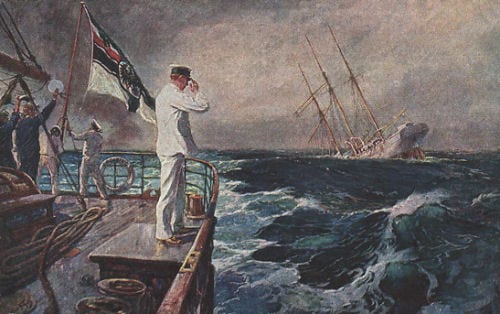Time for the third and final in the FbF series of The Swan of the East; the SMS EMDEN.
If you missed them the first time around, you can find Part I here, and Part II here.
Every Sailor, regardless of their nation, should know the story of The Ayesha by Kapitänleutnant Hellmuth von Mücke;
Taking no one with me, I got into the steam launch and went out to the schooner to learn whether she was at all seaworthy. The captain and a single sailor were aboard her. Of the former I inquired casually whether he had any ammunition aboard, for I did not wish him to suspect the real purpose of my coming. He said there was none, and a brief inspection of the ship led me to believe that she was still seaworthy. Consequently I sent my officers and men aboard the "Ayesha" to get her into trim for sailing.
There was plenty to do on the little ship. All the sails and rigging had been taken down and stowed away, and had now to be put in place again.
When the Englishmen on the island realized that it was my intention to sail off in the schooner, they warned me with great earnestness against trusting ourselves to her, saying that the "Ayesha" was old and rotten, and could not stand a sea voyage. Furthermore, they informed me that an English man-of-war, the "Minotaur," and a Japanese cruiser were in the vicinity of the island, and that we would surely fall a prey to one of them. As my predecessor in command of the "Ayesha" was leaving her, he wished us Godspeed, and concluded with the comforting remark, "But the ship's bottom is worn through."When, in spite of all these warnings, we remained firm in our purpose, and continued the work of getting the "Ayesha" ready for sea, the sporting side of the situation began to appeal to the Englishmen, and they almost ran their legs off in their eagerness to help us. Could it have been gratitude that impelled them to lend us their aid? It is a question I have never been able to answer to my satisfaction, although, to be sure, several of them did express a feeling of relief at the thought that now the fatiguing telegraph service with its many hours of overwork, and its lack of diversion, was a thing of the past. They showed us where the provisions and water were kept, and urgently advised us to take provisions from the one side, where they were new and fresh, rather than from the other, where they were stale. They fetched out cooking utensils, water, barrels of petroleum, old clothes, blankets, and the like, and themselves loaded them on trucks and brought them to us. From every side invitations to dinner poured down upon us; my men were supplied with pipes and tobacco; in short, the Englishmen did all they could to help us out.
Read it all; for free online or buy the book.





It has made for a fine three weeks, CDR. Our thanks!
Turns out there is a movie too....
https://www.youtube.com/watch?v=JvjQbwxfnec